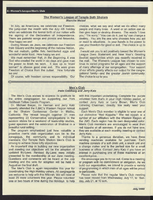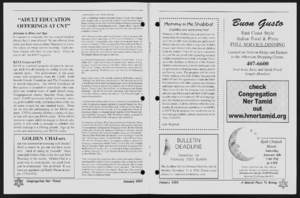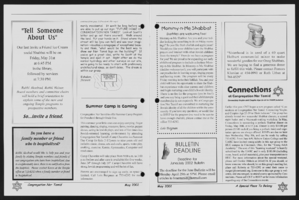Search the Special Collections and Archives Portal
Search Results
Jean Ford Papers
Identifier
Abstract
The Jean Ford Papers (1958-1996) include political documents, campaign materials for Jean Ford's political campaigns, and materials pertaining to campaign issues such as health services, general improvement districts, and parks and recreation. There is extensive material on Red Rock National Conservation Area, Lake Mead National Recreation Area, and the National Issues Forum. Women's issues cover the years 1964-1981 and contain information relating to the League of Women Voters, Equal Rights Amendment (ERA), and International Women's Year (IWY), as well as Anti-ERA and Anti-IWY materials.
Archival Collection

Greg Phelps oral history interview: transcript
Date
Archival Collection
Description
Oral history interview with Greg Phelps conducted by Claytee D. White on November 15, 2017 for the Remembering 1 October Oral History Project. Greg Phelps discusses moving to Las Vegas, Nevada in 2002 for work and attending the 2017 Route 91 Harvest festival with his mother and wife. He describes the event venue as well as his recollection of the shooting. Phelps explains how his life changed after that day, describing the true friendships he gained and his greater appreciation for living.
Text

Transcript of interview with Byron Underhill by Joyce Moore, March 20, 2002
Date
Archival Collection
Description
Byron Underhill's father owned the first Coca-Cola bottling plant, the first beer distributorship, and the first bowling alley in Las Vegas. Byron moved here from Needles, Calif., with his family in 1927. Byron later took over the bottling plant, served in the Army as an aircraft mechanic and a glider pilot during World War II, was a private pilot who worked with Search and Rescue, played in various bands, and suggested to the Lions club that they found a burn unit at University Medical Center that is still the only one in the state
Text

Transcript of interview with Christie Young by Dennis McBride, October 18, 1998
Date
Archival Collection
Description
I've known Christie Young for many years and was grateful she agreed to be interviewed for the Las Vegas Gay Archives Oral History Project. Not only is she frank in what she says, but her background as a researcher in sexual issues and as a straight woman involved in the gay community give her a unique perspective. Ancillary to her donation of this interview transcript to the University of Nevada, Las Vegas, Christie has generously donated her personal journals which detail more than a decade of her life including the years she worked with Las Vegas's gay community . Christie shares the project's concern that documentation of the gay community is ephemeral and vanishes rapidly; her determination that her contribution to that community be preserved greatly enriches our knowledge and will benefit future scholars.
Text

Transcript of interview with Nora Luna by Maribel Estrada Calderón, November 7, 2018
Date
Archival Collection
Description
Nora Luna (1971 - ), the daughter of Mexican immigrants, recalls her growing up experience in the Las Vegas Valley. During her childhood, she and her siblings frequently persuaded their father to take them out to eat to the Circus Circus buffet. She enjoyed playing the carnival games at the Circus Circus. She attended Las Vegas High School. In 1994, she graduated from UNLV with a degree in criminal justice. Her education inspired her to work with the community’s youth. She tutored children at the Y.M.C.A. of Southern Nevada. Luna also worked for a program, Anahuac, which sought to deconstruct some of the myths that often prevent Latinos from attending college. In Reno, Nevada she worked with non-profit organizations to implement evidence-based practices for youth development. Luna has worked for Nathan Adelson Hospice as the Director of Diversity and Grant Funding since 2008. She seeks to find culturally competent care for Latinos and ensures that the hospice provides informational r
Text




